
“Such a great dental surgery. Manager Joanne was so helpful as are all the nurses and staff. Mr Naidu is an amazing dentist he really knows what he's doing fantastic surgeon. Totally happy..a truly professional Team. Today 25th April. I see Sheetal Naidu for Root Canal treatment honestly was an eye opener such an expert and I've never had treatment like it. Great Dental surgeons."
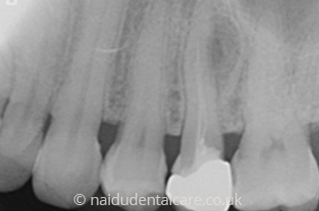
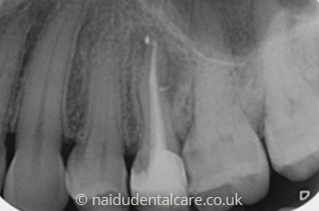
This case involved root canal retreatment of the upper second premolar and provisional placement of a composite core.
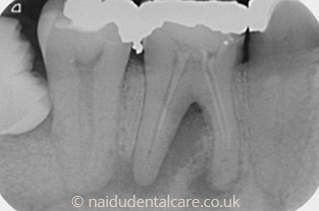
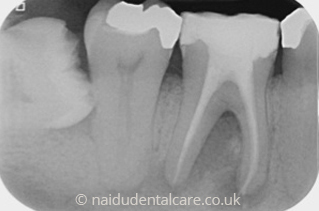
Root canal treatment was repeated for this molar, followed by placement of a composite core.
Endodontics (Root Canal Treatments) is one of the 13 official dental specialties recognised by the General Dental Council, the UK dental profession's regulatory body (a list of these specialties and accredited specialists can be found on the GDC Website).


Endodontics focuses on the management of conditions affecting the pulp of the tooth. The pulp sits inside the tooth and consists of a bundle of nerves and blood vessels. It can be damaged in different ways including decay, trauma, cracks, etc.
If the pulp becomes damaged beyond repair, the infection can spread throughout the root canal system of the tooth. This can eventually lead to an abscess forming and causing severe pain and swelling and the tooth may have to be extracted rather than preserved with a root canal treatment.


Endodontic Treatment or Root Canal Treatment involves removing the damaged or dead pulp and disinfecting the space that is left behind. The space is then filled with a material that seals the tooth to prevent bacteria returning to the area. The tooth can then be filled but a crown is often advised to provide extra strength and support to the root-treated tooth.
At Naidu & Naidu, we are proud to have Sheetal looking after this aspect of dentistry. She is currently undertaking the Specialist Training Programme in Endodontics at Guys, Kings and St Thomas' Hospital and will be able to help you throughout the treatment.
Sheetal will look after you in a calm and relaxed way and you can be certain that the treatment will be undertaken using the latest techniques, materials and equipment including the use of a high-powered operating microscope.
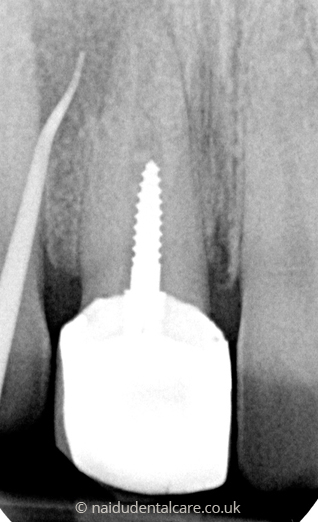
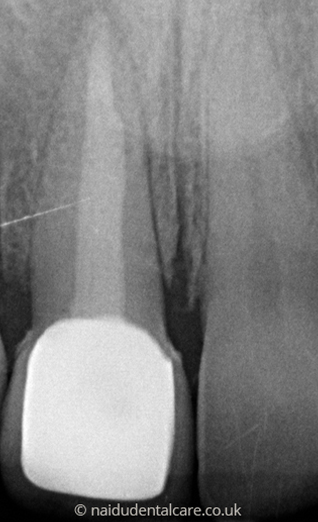
Treatment of this tooth involved removal of a screw post followed by placement of a MTA plug and fibre post and construction of a new porcelain bonded crown.
Root canal therapy, also known as endodontic treatment, is a procedure used to save an infected or decayed tooth. It involves removing the infected or damaged pulp from the tooth's root canal, cleaning and disinfecting the area, and then sealing it to prevent further infection.
Root canal therapy is necessary when the pulp, the soft tissue inside the tooth, becomes infected or damaged. This can happen due to untreated cavities, cracked or chipped teeth, or trauma to the tooth. If left untreated, the infection can spread to the surrounding tissues and cause severe pain, abscesses, and even tooth loss.
Some common signs that you may need a root canal include severe toothache, sensitivity to hot or cold temperatures, swelling and tenderness around the tooth, darkening of the tooth, and a recurring pimple on the gums. However, only a dentist can determine if a root canal is necessary after conducting a thorough examination.
Contrary to popular belief, root canal therapy is not as painful as people think. With modern advancements in dental technology and anesthesia, the procedure is relatively painless. Most patients report feeling minimal discomfort during and after the procedure. Your dentist will also prescribe medication to alleviate any post-operative pain or discomfort.
The length of a root canal procedure can vary depending on the complexity of the case. On average, it takes one to two appointments to complete a root canal. The first appointment typically involves cleaning out the infected pulp and applying medication. The second appointment focuses on sealing the root canal and placing a dental crown or filling on the tooth.
While root canal therapy is a highly successful procedure, there is a slight chance of failure. It can occur if the tooth was not properly cleaned and disinfected, the canals were not thoroughly sealed, or if a new infection develops. In such cases, retreatment or an apicoectomy, which involves removing the tip of the tooth's root, may be necessary.
With proper oral hygiene and regular dental check-ups, a root canal-treated tooth can last a lifetime. However, it is essential to maintain good oral hygiene practices, such as brushing twice a day, flossing daily, and visiting your dentist regularly, to ensure the longevity of the restored tooth.
The only alternative to root canal therapy is tooth extraction. However, extracting a tooth should be considered a last resort, as it can lead to other problems such as shifting of teeth, difficulty chewing, and loss of bone in the jaw. It is generally recommended to save the natural tooth whenever possible.
Generally, you should be able to drive home after a root canal procedure. However, if you received sedation or anesthesia during the treatment, you may feel lightheaded or drowsy afterwards. In such cases, it is best to have someone accompany you or arrange for transportation.
After a root canal, it is best to avoid chewing on the treated tooth until the permanent filling or dental crown is placed. This is to prevent any damage to the tooth. However, you can typically resume your regular diet once the tooth is fully restored.
Yes, root canal therapy is a safe and common dental procedure. Dentists are trained and experienced in performing root canals, ensuring patient safety and comfort. By addressing the underlying infection and preserving the natural tooth, root canal therapy can help restore oral health and function.
No, root canal therapy can be performed on children as well. Baby teeth, also known as primary teeth, play a crucial role in the development of permanent teeth and should be preserved whenever possible. Your dentist will determine if root canal therapy is suitable for your child based on their specific case.
In conclusion, root canal therapy is a safe and effective treatment for saving infected or damaged teeth. With the use of modern dental techniques, the procedure has become relatively painless. If you experience tooth pain or other symptoms, it is essential to consult with a dentist, who can diagnose the problem and recommend the appropriate treatment option for your specific dental needs.


Monday 08:00 am - 13:00 pm,
14:00 pm - 18:00 pm
Tuesday to Friday 08:00 am - 13:00 pm,
14:00 pm - 17:00 pm
Saturday - 08:00 am - 13:00 pm
Email: [email protected]
Call us today: 01708 346 540 / 01708 341 587
Address: 132 Gubbins Lane, Harold Wood, Essex RM3 0DP